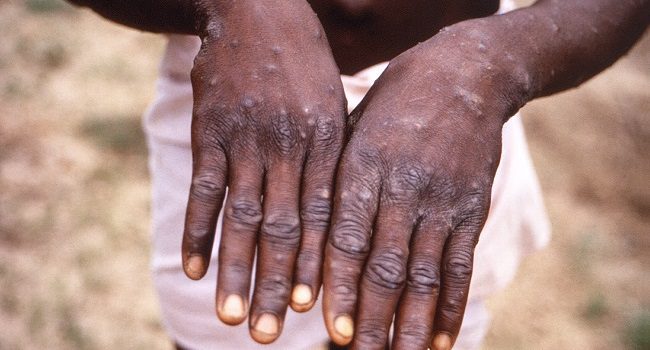Global Issues
Monkey pox: Protecting Yourself And What To Watch Out For -By Sandra Ijeoma Okoye
As a Nigerian that seeks self-help about Monkey Pox, I resorted to explore the website of MedlinePlus that has the mission to present high-quality, relevant health and wellness information that is trusted, easy to understand.

It is not an exaggeration to say that to tackle Monkey pox outbreak in Nigeria that the leadership of the Nigeria Centre for Disease Control (NCDC),being the national public health institute that has the mandate to lead the preparedness, detection and response to infectious disease outbreaks and public health emergencies in Nigeria has impressively not enlightened Nigerians about the disease.
The reason the foregoing condemnatory view about the Centre in this context cannot be farfetched as the vision of the NCDC is to ensure a healthier and safe Nigeria through the prevention and control of diseases of public health importance, while its mission is to protect the health of Nigerians through evidence based prevention, integrated disease surveillance and response activities, using a one health approach, guided by research.
In fact, its core functions are to prevent, detect and control diseases of public health importance, coordinate surveillance systems to collect, analyze and interpret data on diseases of public health importance. The Centre is also mandated to respond to small outbreaks, and lead the response to large disease outbreaks as well as develop and maintain a network of reference and specialized laboratories, conduct, collate, synthesize and disseminate public health research to inform policy and lead Nigeria’s engagement with the international community on diseases of public health relevance.
Given the foregoing view, as a reader, you may have been wondering why yours sincerely is throwing light to the constitutional mandate of the NCDC. Of course, it is expedient to throw light to NCDC’s responsibilities, particularly as the World Health Organization (WHO) on Saturday declared the Monkey Pox virus a public health emergency of international concern, and given the fact that there is need for a coordinated response as a way of preventing and ending the spread of the disease, and protection of people in various communities from being infected by the dreaded disease.
Unfortunately, since the news of Monkey Pox began to trend, not many Nigerians know about the disease, particularly about its nature, and how it spreads. However, being aware that Nigeria is a country where every household is its own local government, particularly as people resort to self-help in generating electricity through the use of “I-pass-my-neighbor” generator, contribution of levy within a given neighborhood to engage private guards to secure people in the neighborhood, particularly on the basis of street security watch, constructions of boreholes for provision of water, and even as cooperatively contributing money to repair bad streets, I was compelled to buy data to enable me access the internet for me to understand what Monkey Pox really is, how it is spread, to enable me enlighten members of my family and friends about the dreaded disease, and to a large extent share the knowledge with fellow Nigerians such as been done in this context through this piece.
As a Nigerian that seeks self-help about Monkey Pox, I resorted to explore the website of MedlinePlus that has the mission to present high-quality, relevant health and wellness information that is trusted, easy to understand.
Given the foregoing, what then is monkey pox? From the information I gathered from the website, Monkey pox is a rare disease caused by infection with the monkey pox virus. The monkey pox virus is in the same family of viruses as the smallpox virus. But monkey pox is less contagious than smallpox. And its disease causes milder symptoms and is usually not fatal.
In the past, most of the people who got monkey pox lived in certain parts of central and western Africa, had traveled there, or had been exposed to infected animals imported from there. During the 2022 outbreak, the disease has been found in people who live in other countries, including the United States.
At this juncture, it is expedient to say that having understood what monkey pox is, the question is how does monkey pox spread? The answer cannot be farfetched as the disease spreads in different ways: It can be contacted when you are in close contact with someone who has the virus, through direct contact with their rash, scabs, or body fluids, by breathing in the virus during prolonged, face-to-face contact or during intimate physical contact such as kissing, cuddling, or sex, from touching items (such as clothes, bedding, or towels) that were used by someone who has the virus, during pregnancy, from the pregnant parent to the baby, from infected animals and by being scratched or bitten by the animal.
Other means of contact are by preparing or eating meat or using products from the animal, and someone who has monkey pox can spread it from the time their symptoms start until their rash has fully healed. This can take several weeks. People who do not have monkey pox symptoms cannot spread the virus to others. At this time, it is not known if monkey pox can spread through semen or vaginal fluids.
What I also gathered from the website is knowledge about what the symptoms of monkey pox are. As gathered, the symptoms of monkey pox may include fever, headache, muscle aches and backache, swollen lymph nodes (“swollen glands”), chills and exhaustion.
Symptoms can also come in the form of rash with sores that can look like pimples or blisters. It could be on the face, inside the mouth, and on other parts of the body, like the hands, feet, chest, genitals, or anus. It goes through different stages before healing completely. This can take several weeks.
Not only that, sometimes, people get a rash first, followed by other symptoms. Others may only get a rash.
In the same vein, I was by virtue of my access to the website to peep into how monkey pox is diagnosed. In this regard, it is advisable to say that to find out if you have monkey pox, your health provider will ask about your symptoms and health history, and will look at your rash, take a sample of tissue from one of the sores so it can be tested for monkey pox virus, may do blood tests to check for monkey pox virus or for antibodies to the virus. For the sake of clarity, antibodies are proteins that your immune system makes to fight foreign substances, such as viruses and bacteria.
Still going through the website of MedlinePlus, I got to understand that the treatments for monkey pox are not specific but many people get better on their own. In fact, I was made to understand that since monkey pox and smallpox are similar, antiviral medicines and vaccines that protect against smallpox may also help treat and prevent monkey pox. Also, antiviral medicines may be recommended for people who are more likely to get severely ill, such as patients who have weakened immune systems.
As I ponder on the information gathered so far, a question popped into my head, and the question goes thus; “Can monkey pox be prevented? In answering the question, the website has it that there are steps you can take to help prevent monkey pox: First is to avoid close, skin-to-skin contact with the monkey pox rash. So, while a person is sick with monkey pox, do not touch their rash or scabs, do not kiss, hug, cuddle, or have sex with them, do not share eating utensils or cups with them and do not touch the bedding, towels, or clothing of a person who has monkey pox.
In a similar vein, wash your hands often with soap and water or use an alcohol-based hand sanitizer, especially after contact with sick people, and avoid contact with animals that can spread monkey pox virus, such as rodents and primates. Also, avoid sick or dead animals, as well as any bedding or other materials they have touched.
If you are sick with monkey pox, you should isolate at home. If you have an active rash or other symptoms, you should be in a separate room from your family members and pets when possible.
In fact there is need for this update as NCDC has recently disclosed that between January and June, that the country recorded a total of 204 suspected Monkey pox, cases out of which 62 cases were confirmed to be positive.
Disclosing these during a Virtual media dialogue on Monkey pox titled: “Monkey pox Spread, Infodemic and Public Health Response in Nigeria.” the Incident Manager, National Monkey pox Emergency Operations Centre, Dr. Lateefat Amao, said between 2017 and June 2022, that about 25 States have recorded cases of Monkey pox in Nigeria. It will also be interesting to note that since the disclosure was made that more cases are being recorded. For instance, the Edo State Ministry of Health, on Monday, revealed that eight persons have tested positive for monkey pox in the state, urging residents to observe safety measures to reduce the spread of the virus and other infectious diseases. The state Commissioner for Health, Prof. Akoria Obehi, who disclosed this to journalists in Benin City, said the ministry has ramped up surveillance and other activities to curb the spread of infectious diseases.



















